Jihadi John: Mohammed Emwazi 'considered suicide to escape MI5 spies' before fleeing to Syria
Emails revealed his paranoia but he still managed to escape Britain for Syria

The British man named as Isis executioner Jihadi John revealed his hatred and fear of security services in a series of emails in 2010, saying he considered suicide because he felt like a “dead man walking”.
Mohammed Emwazi was indeed being watched by MI5, which had been aware of his extremist links for six years before he apparently appeared on video beheading American journalist James Foley in August.
Previous revelations that he apparently managed to escape to Syria to become Isis’ Western poster boy while supposedly under surveillance have provoked outrage and sparked demands for an urgent review.
In a series of emails to Robert Verkaik, Emwazi claimed he had considered suicide after coming face to face with a man he believed to be a spy.
The computer studies graduate was selling his laptop when he said the buyer called him by his first name, despite Emwazi not telling him what it was.
“I felt shocked, & paused for a few seconds as he walked away,” he wrote in an email revealed by the Mail on Sunday.
“I knew it was them!! Sometimes i feel like im a dead man walking, not fearing they may kill me.
“Rather, fearing that one day, I’ll take as many pills as I can so that I can sleep for ever!! I just want to get away from these people!!! (all sic)”
Emwazi, a Kuwait-born Briton who came to UK at the age of six and lived in west London until 2012, had long complained of his life being controlled by MI5.
The Independent revealed in 2010 allegations that he had been illegally detained on the agency’s orders while trying to enter Tanzania for a week-long safari holiday.
Identified then as Muhammad ibn Muazzam, he and two friends alleged they were threatened with beatings by members of Tanzania's security forces and questioned by MI5 agents over alleged links to Islamic extremists.

Emwazi said he was informed on his return to the UK that they were on a terror watch list which prevented them travelling to any Muslim country.
In an email to campaign group Cage, he wrote that he felt like “a person imprisoned and controlled by security service men”, stopping him from living the new life he wanted in Kuwait.
The emails emerged as a man calling himself Abu Ayman, a defector from Isis, told BBC News that Emwazi was a “cold” loner. “He didn’t talk much. He wouldn’t join us in prayer,” he said. “The other British brothers prayed with us, but he was strange. The other British brothers would say ‘hi’ when they saw us on the road, but he turned his face away.”
He said some Isis fighters “love him” and had joined the movement after “watching and admiring him”. “Isis play him like a piano. He’s a celebrity to attract our Muslim brothers in Europe, but some think he is showing off; they think he’s being used by Isis.”
The boss of a Kuwaiti IT firm which employed Emwazi told The Guardian that he was “the best employee we ever had”, describing him as “calm and decent” and “very good with people”.
“How could someone as calm and quiet as him become like the man who we saw on the news? It's just not logical that he could be this guy,” the employer, who was not named, said.
“I have no answers for this. He wasn't sociable. He was always earnest. He didn't smile. But he wasn't bad.”
He speculated that “maybe he fell into the wrong hands when he went back” to the UK.
Asim Qureshi, Cage’s research director, described Emwazi in that period as “a beautiful young man”, who was “kind and gentle”.
He was heavily criticised for seeming to suggest that British security services had driven him to extremism by treating people like “outsiders” who eventually “look for belonging elsewhere”.

Home Secretary Theresa May and the Prime Minister defended the intelligence services, calling them “true heroes”.
Emwazi’s email was written three months after he sent another to Cage in which he expresses support for “our sister Aafia Siddiqui”.
This refers to a US-trained neuroscientist, currently serving a long jail term in the United States, who was considered to have links to senior Osama bin Laden lieutenants and was placed on an FBI list of the seven most-wanted fugitives from al-Qaeda in 2004.
However, there is widespread sympathy in Pakistan for the plight of a woman who was seen as being mentally ill, and the country’s leaders have demanded her release.

Isis has also frequently called for her release from a Texas prison where she is serving 86 years for attempted murder after grabbing a gun and shooting at her interrogators following her arrest in Afghanistan.
She was found with documents on chemical weapons indicating attack planning.
Her freedom was said to be one of a litany of demands issued by Isis for the release of James Foley before his death.
Emwazi is thought to have been the masked English-speaking jihadist in Isis’ videos showing the murder of US journalist Steven Sotloff, British aid worker David Haines, British taxi driver Alan Henning, and American aid worker Abdul-Rahman Kassig, who was also known as Peter.
He was previously part of a cell dubbed The London Boys orchestrated by Bin Laden to wreak terror on the streets of London, including having a role in the failed July 21 bomb attacks in 2005, three weeks after the 7/7 bombings, court documents reportedly claim.

Papers seen by the Observer suggest Emwazi was part of a group including three members who allegedly trained at an al-Qaeda camp.
Details of his involvement in the cell were reportedly disclosed during a court hearing in 2011 - two years before Emwazi fled for Syria after complaining of harassment from the secret services.
Additonal reporting by PA
Bookmark popover
Removed from bookmarks